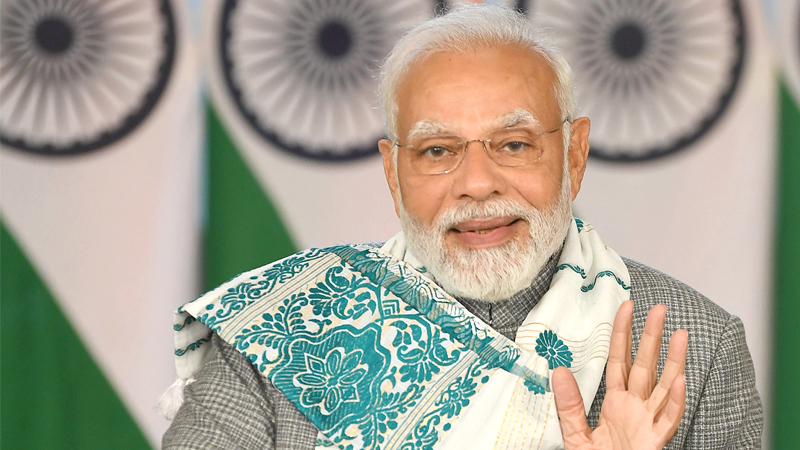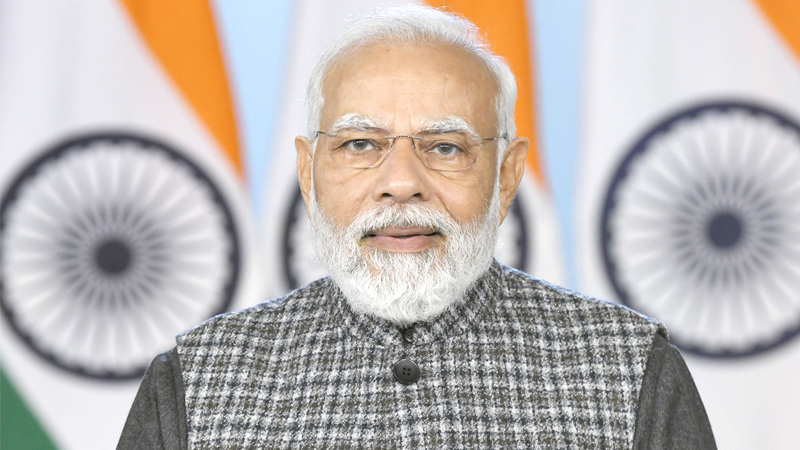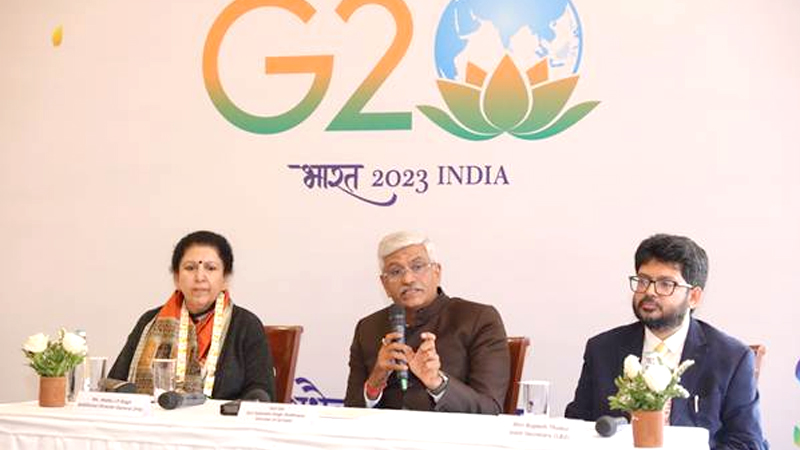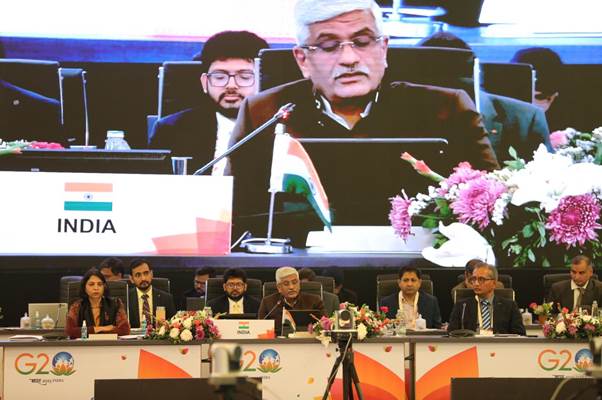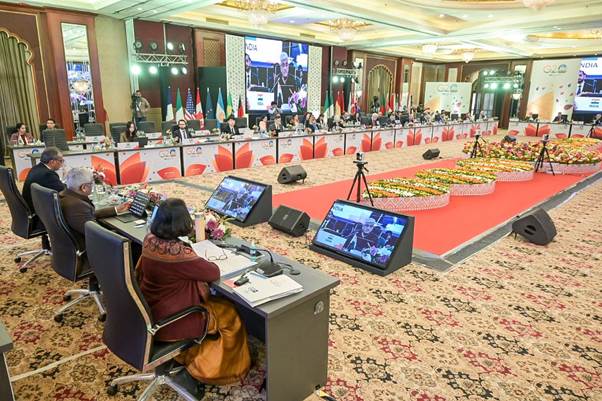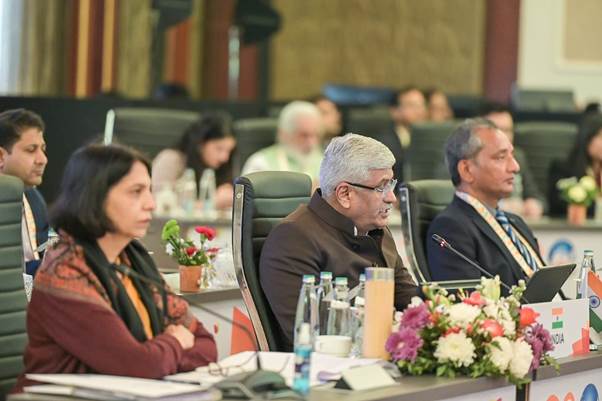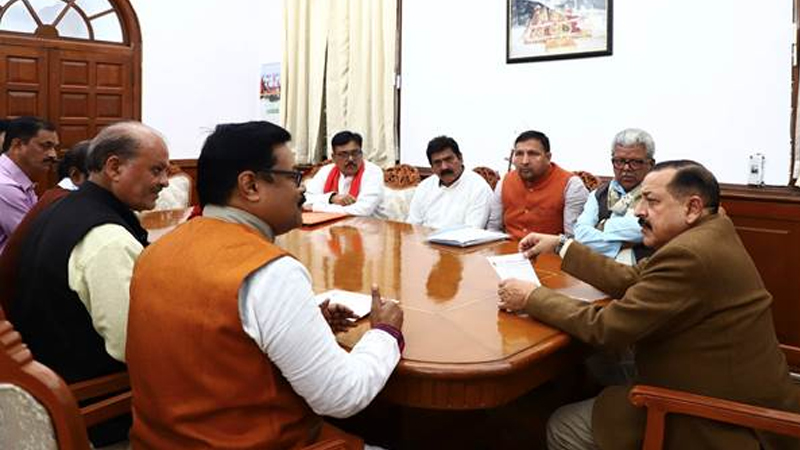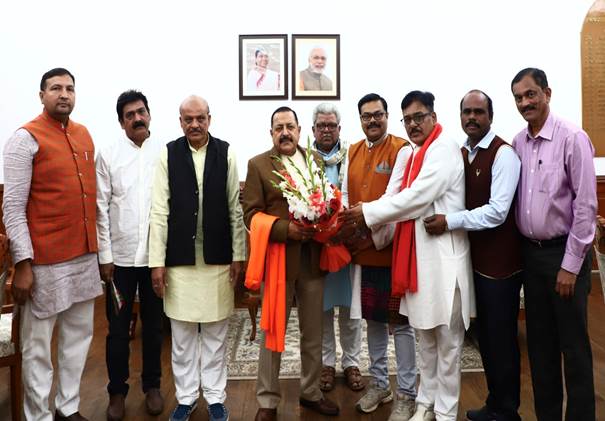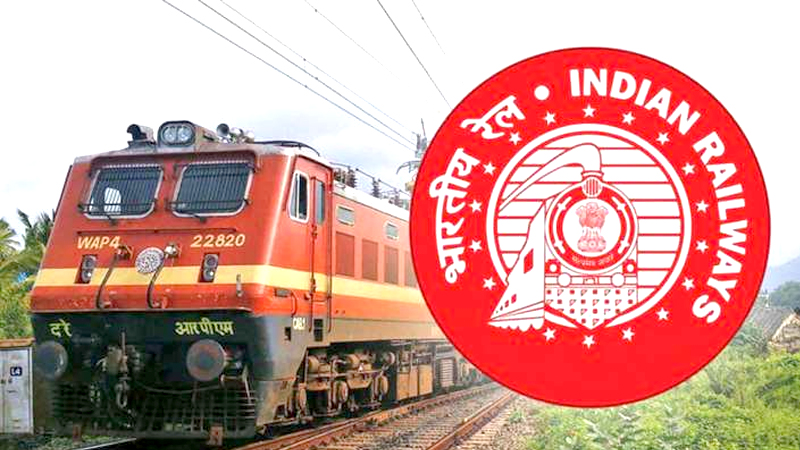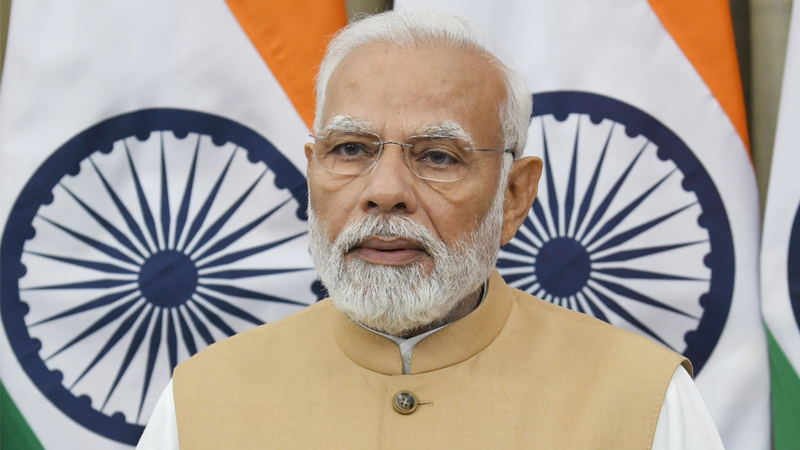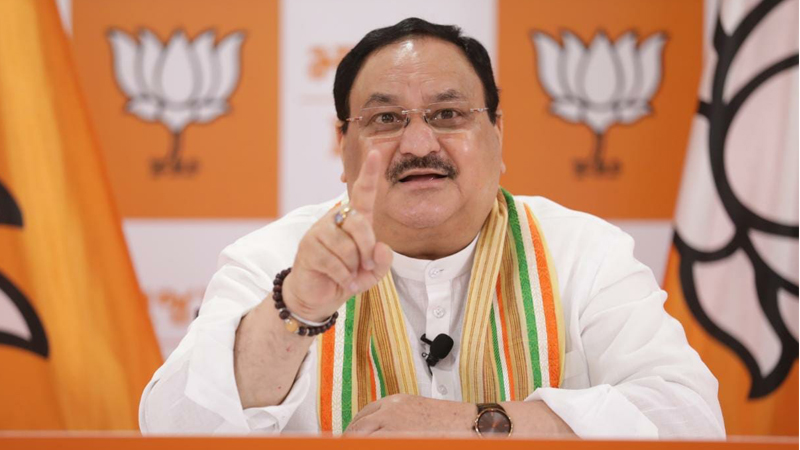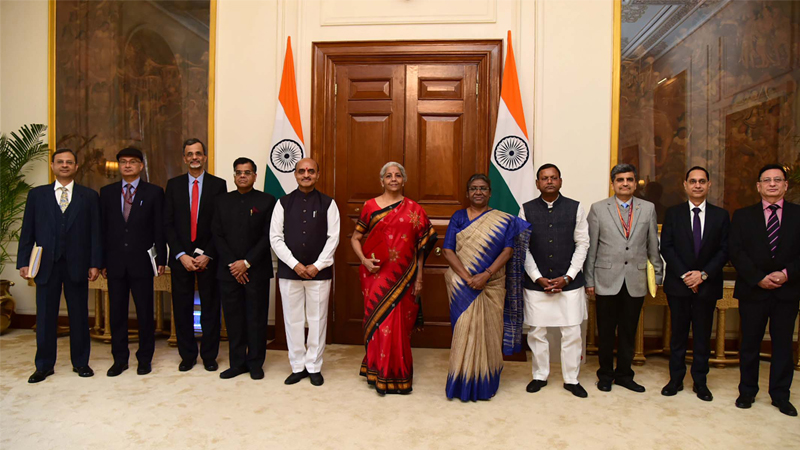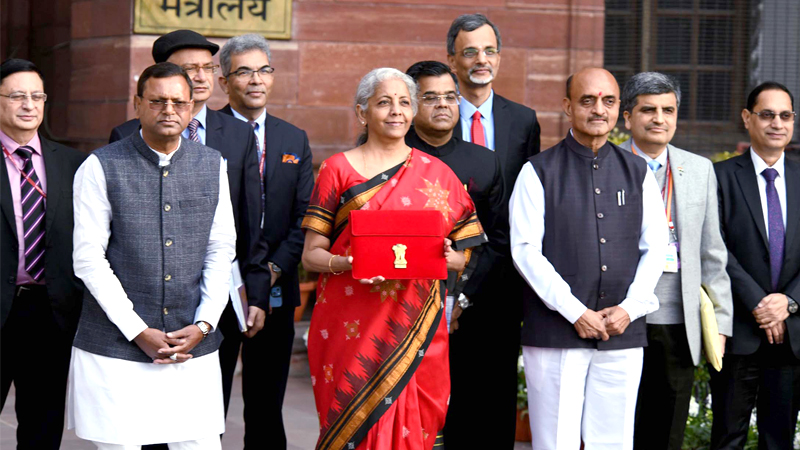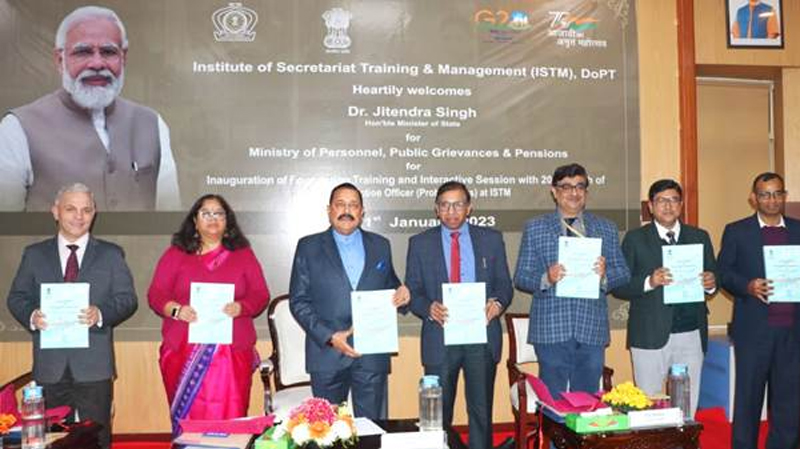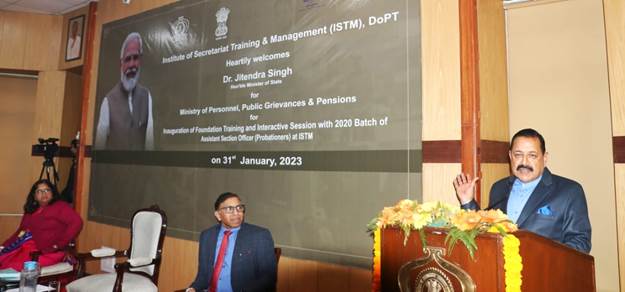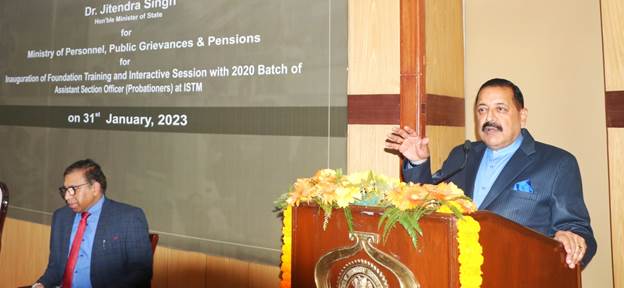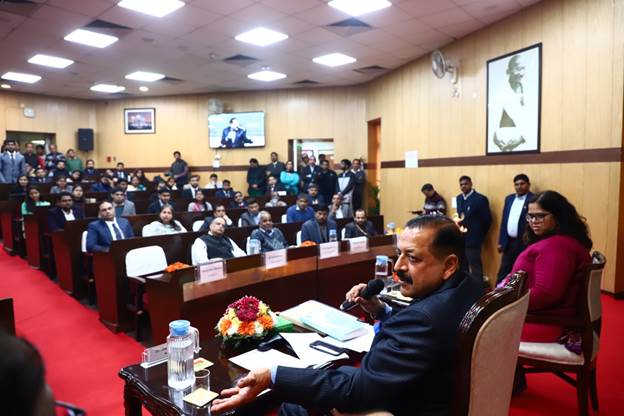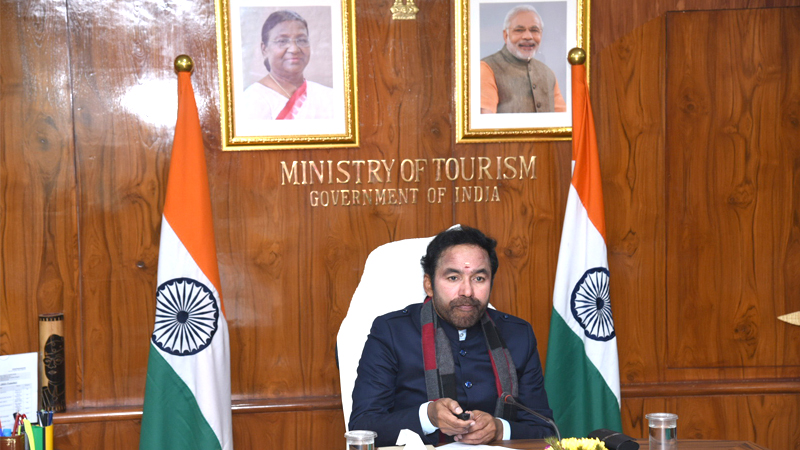In the 75th year of India’s Independence, the World has recognized the Indian Economy as a ‘bright star’ as the Economic Growth is estimated at 7 per cent, which is the highest among all major economies, in spite of the massive global slowdown caused by COVID-19 and Russia-Ukraine War. This was stated by Union Minister for Finance & Corporate Affairs Smt. Nirmala Sitharaman, while presenting the Union Budget 2023-24 in Parliament today. She emphasized that Indian economy is on the right track, and despite a time of challenges, heading towards a bright future.
PART-A
Smt. Sitharaman said that this Budget hopes to build on the foundation laid in the previous Budget, and the blueprint drawn for India@100, which envisions a prosperous and inclusive India, where the fruits of development reach all regions and citizens, especially our youth, women, farmers, OBCs, Scheduled Castes and Scheduled Tribes.
Resilience amidst multiple crises
The Finance Minister said that India’s rising global profile is due to several accomplishments like unique World Class Digital Public Infrastructure namely, Aadhaar, Co-Win and UPI; COVID-19 vaccination drive in unparalleled scale and speed; proactive role in frontier areas such as achieving the climate related goals, mission LiFE, and National Hydrogen Mission.
She said that during the Covid-19 pandemic, Government ensured that no one goes to bed hungry, with a scheme to supply free food grains to over 80 Crore persons for 28 months. The Minister added that continuing with Centre’s commitment to ensure food and nutritional security, Government is implementing, from 1st January 2023, a scheme to supply free food grain to all Antyodaya and priority households for the next one year, under PM Garib Kalyan Anna Yojana (PMGKAY). The entire expenditure of about Rs 2 lakh crore will be borne by the Central Government.
G20 Presidency: Steering the global agenda through challenges
The Finance Minister pointed out that in these times of global challenges; the G20 Presidency gives India a unique opportunity to strengthen its role in the world economic order. With the theme of ‘Vasudhaiva Kutumbakam’, India is steering an ambitious, people-centric agenda to address global challenges, and to facilitate sustainable economic development, she added.
Achievements since 2014: Leaving no one behind
Smt. Sitharaman said that the government’s efforts since 2014 have ensured for all citizens a better quality of living and a life of dignity and the per capita income has more than doubled to Rs 1.97 lakh. She said that in these nine 9 years, the Indian economy has increased in size from being 10th to 5th largest in the world. Moreover, the economy has become a lot more formalized as reflected in the EPFO membership, more than doubling to 27 crore, and 7,400 crore digital payments of Rs 126 lakh crore through UPI in 2022.
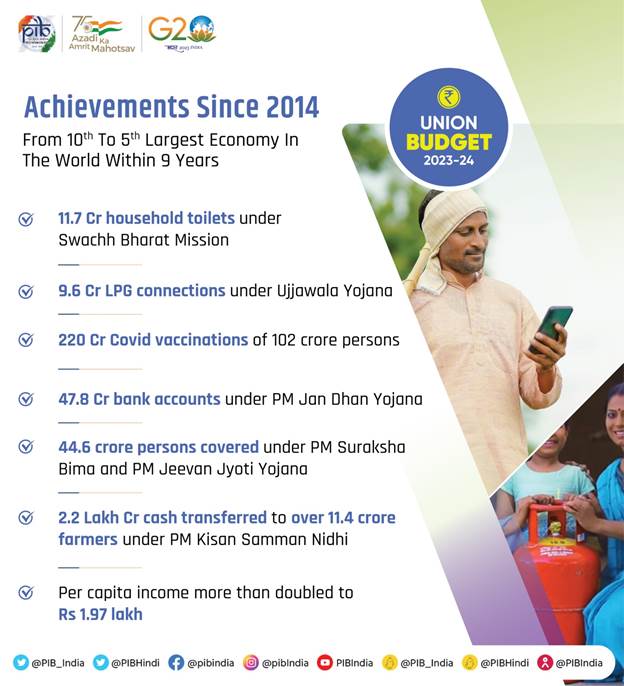
The Finance Minister pointed out that the efficient implementation of many schemes, with universalisation of targeted benefits, has resulted in inclusive development and listed some of the schemes such as 11.7 crore household toilets under Swachh Bharat Mission, 9.6 crore LPG connections under Ujjawala, 220 crore Covid vaccinations of 102 crore persons, 47.8 crore PM Jan Dhan Bank Accounts, Insurance cover for 44.6 crore persons under PM Suraksha Bima and PM Jeevan Jyoti Yojana, and Cash transfer of Rs 2.2 lakh crore to over 11.4 crore farmers under PM Kisan Samman Nidhi.
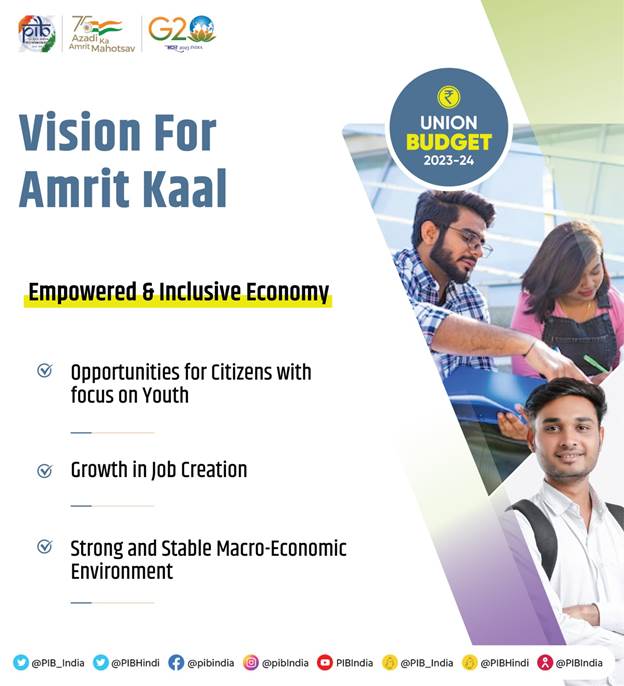
Vision for Amrit Kaal – an empowered and inclusive economy
The Finance Minister said that our vision for the Amrit Kaal includes technology-driven and knowledge-based economy with strong public finances, and a robust financial sector and to achieve this, Jan Bhagidari through Sabka Saath Sabka Prayas is essential. She added that the economic agenda for achieving this vision focuses on three things and those are facilitating ample opportunities for citizens, especially the youth, to fulfill their aspirations, secondly, providing strong impetus to growth and job creation and finally to strengthen macro-economic stability. She added that to service these focus areas in our journey to India@100, the following four opportunities can be transformative during Amrit Kaal-
- Economic Empowerment of Women: Deendayal Antyodaya Yojana National Rural Livelihood Mission has achieved remarkable success by mobilizing rural women into 81 lakh Self Help Groups and we will enable these groups to reach the next stage of economic empowerment through formation of large producer enterprises or collectives with each having several thousand members and managed professionally.
- PM VIshwakarma KAushal Samman (PM VIKAS): For centuries, traditional artisans and craftspeople, who work with their hands using tools, have brought renown for India and they are generally referred to as Vishwakarma. The art and handicraft created by them represents the true spirit of Atmanirbhar Bharat.
The Finance Minister informed that for the first time, a package of assistance for them has been conceptualized and the new scheme will enable them to improve the quality, scale and reach of their products, integrating them with the MSME value chain. The components of the scheme will include not only financial support but also access to advanced skill training, knowledge of modern digital techniques and efficient green technologies, brand promotion, linkage with local and global markets, digital payments, and social security. This will greatly benefit the Scheduled Castes, Scheduled Tribes, OBCs, women and people belonging to the weaker sections.
- Tourism: The Finance Minister said that the country offers immense attraction for domestic as well as foreign tourists, as there is a large potential to be tapped in tourism. She added that the sector holds huge opportunities for jobs and entrepreneurship for youth in particular and emphasized that promotion of tourism will be taken up on mission mode, with active participation of states, convergence of government programmes and public-private partnerships.
- Green Growth: Dwelling on the subject of Green Growth, the FM said that India is implementing many programmes for green fuel, green energy, green farming, green mobility, green buildings, and green equipment, and policies for efficient use of energy across various economic sectors. These green growth efforts help in reducing carbon intensity of the economy and provides for largescale green job opportunities, she added.
Priorities of this Budget
Smt. Nirmala Sitharaman listed seven priorities of the Union Budget and said that they complement each other and act as the ‘Saptarishi’ guiding us through the Amrit Kaal. They are as follows: 1) Inclusive Development 2) Reaching the Last Mile 3) Infrastructure and Investment 4) Unleashing the Potential 5) Green Growth 6) Youth Power 7) Financial Sector
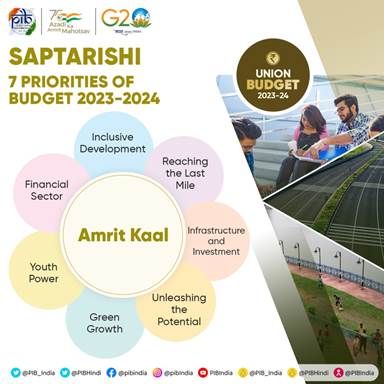
Priority 1: Inclusive Development
The Government’s philosophy of Sabka Saath Sabka Vikas has facilitated inclusive development covering in specific, farmers, women, youth, OBCs, Scheduled Castes, Scheduled Tribes, divyangjan and economically weaker sections, and overall priority for the underprivileged (vanchiton ko variyata). There has also been a sustained focus on Jammu & Kashmir, Ladakh and the North-East. This Budget builds on those efforts.
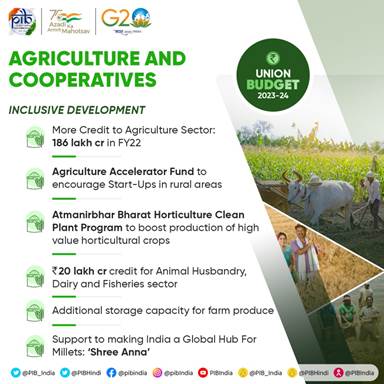
Agriculture and Cooperation
Digital Public Infrastructure for Agriculture
The Finance Minister said that the Digital Public infrastructure for agriculture will be built as an open source, open standard and inter operable public good. She said, this will enable inclusive, farmer-centric solutions through relevant information services for crop planning and health, improved access to farm inputs, credit, and insurance, help for crop estimation, market intelligence, and support for growth of agri-tech industry and start-ups.
Agriculture Accelerator Fund
The FM announces that an Agriculture Accelerator Fund will be set-up to encourage agri-startups by young entrepreneurs in rural areas, which will aim at bringing innovative and affordable solutions for challenges faced by farmers. It will also bring in modern technologies to transform agricultural practices, increase productivity and profitability.
Enhancing productivity of cotton crop
To enhance the productivity of extra-long staple cotton, Government will adopt a cluster-based and value chain approach through Public Private Partnerships (PPP). This will mean collaboration between farmers, state and industry for input supplies, extension services, and market linkages.
Atmanirbhar Horticulture Clean Plant Programme
Smt. Nirmala Sitharaman announced that the Government will launch an Atmanirbhar Clean Plant Programme to boost availability of disease-free, quality planting material for high value horticultural crops at an outlay of Rs 2,200 crore.
Global Hub for Millets: ‘Shree Anna’
Smt. Sitharaman quoted Prime Minister as saying, “India is at the forefront of popularizing Millets, whose consumption furthers nutrition, food security and welfare of farmers”. She said that India is the largest producer and second largest exporter of ‘Shree Anna’ in the world as it grows several types of ‘Shree Anna’ such as jowar, ragi, bajra, kuttu, ramdana, kangni, kutki, kodo, cheena, and sama.
She mentioned that these have a number of health benefits, and have been an integral part of our food for centuries and acknowledged with pride that the huge service done by small farmers in contributing to the health of fellow citizens by growing these ‘Shree Anna’. She added that to make India a global hub for ‘Shree Anna’, the Indian Institute of Millet Research, Hyderabad will be supported as the Centre of Excellence for sharing best practices, research and technologies at the international level.
Agriculture Credit
Dwelling on welfare measures for farmers, the Finance Minister announced that the agriculture credit target will be increased to Rs 20 lakh crore with focus on animal husbandry, dairy and fisheries.
She informed that the Government will launch a new sub-scheme of PM Matsya Sampada Yojana with targeted investment of Rs 6,000 crore to further enable activities of fishermen, fish vendors, and micro & small enterprises, improve value chain efficiencies, and expand the market.
Cooperation
For farmers, especially small and marginal farmers, and other marginalized sections, the government is promoting cooperative-based economic development model. A new Ministry of Cooperation was formed with a mandate to realize the vision of ‘Sahakar Se Samriddhi’. To realise this vision, the government has already initiated computerization of 63,000 Primary Agricultural Credit Societies (PACS) with an investment of Rs 2,516 crore.
In consultation with all stakeholders and states, model bye-laws for PACS were formulated enabling them to become multipurpose PACS. A national cooperative database is being prepared for country-wide mapping of cooperative societies.
Smt. Sitharaman said that Government will implement a plan to set up massive decentralized storage capacity, which will help farmers store their produce and realize remunerative prices through sale at appropriate times. The government will also facilitate setting up of a large number of multipurpose cooperative societies, primary fishery societies and dairy cooperative societies in uncovered panchayats and villages in the next 5 years.
Health, Education and Skilling
Medical & Nursing Colleges
The Finance Minister announced that one hundred and fifty-seven new nursing colleges will be established in co-location with the existing 157 medical colleges established since 2014. She also informed that a Mission to eliminate Sickle Cell Anaemia by 2047 will be launched, which will entail awareness creation, universal screening of 7 crore people in the age group of 0-40 years in affected tribal areas, and counseling through collaborative efforts of central ministries and state governments. On Medical Research, she said that facilities in select ICMR Labs will be made available for research by public and private medical college faculty and private sector R&D teams for encouraging collaborative research and innovation.
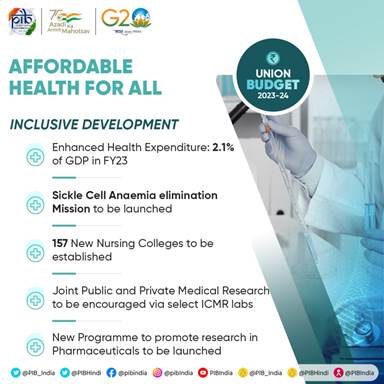
Dwelling on the subject of Pharma Innovation, the Finance Minister informed that a new programme to promote research and innovation in pharmaceuticals will be taken up through centers of excellence. She said that the Government will also encourage industry to invest in research and development in specific priority areas.
Teachers’ Training
Smt. Sitharaman said that Teachers’ training will be re-envisioned through innovative pedagogy, curriculum transaction, continuous professional development, dipstick surveys, and ICT implementation. She added that the District Institutes of Education and Training will be developed as vibrant institutes of excellence for this purpose.
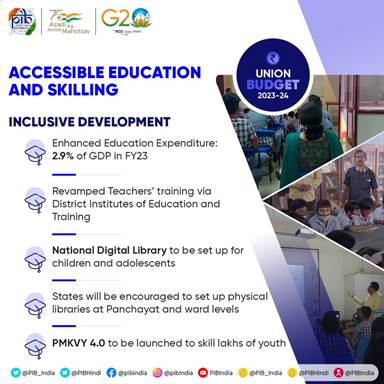
She also informed that a National Digital Library for Children and Adolescents will be set-up for facilitating availability of quality books across geographies, languages, genres and levels, and device agnostic accessibility. States will be encouraged to set up physical libraries for them at panchayat and ward levels and provide infrastructure for accessing the National Digital Library resources.
Additionally, to build a culture of reading, and to make up for pandemic-time learning loss, the National Book Trust, Children’s Book Trust and other sources will be encouraged to provide and replenish non-curricular titles in regional languages and English to these physical libraries.
Priority 2: Reaching the Last Mile
The Finance Minister said that Prime Minister Vajpayee’s government had formed the Ministry of Tribal Affairs and the Department of Development of North-Eastern Region to provide a sharper focus to the objective of ‘reaching the last mile’. She said that Modi Government has formed the ministries of AYUSH, Fisheries, Animal Husbandry and Dairying, Skill Development, Jal Shakti and Cooperation.
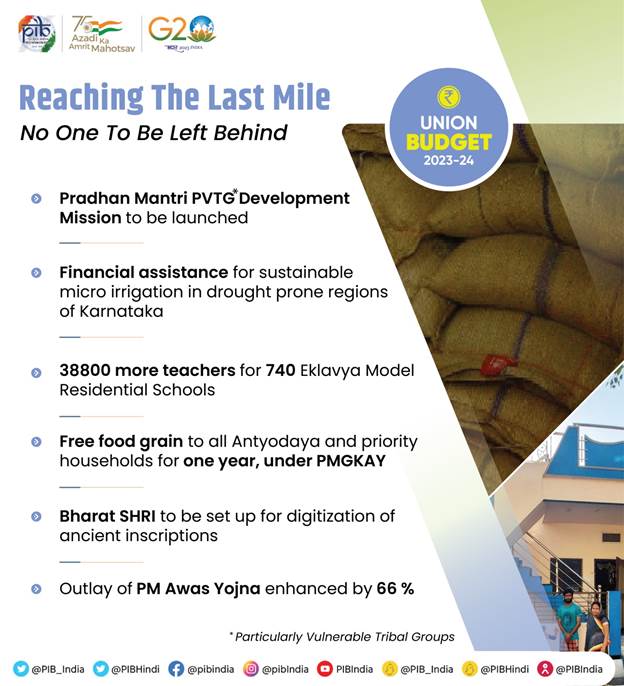
Aspirational Districts and Blocks Programme
Smt. Sitharaman informed that building on the success of the Aspirational Districts Programme, the Government has recently launched the Aspirational Blocks Programme covering 500 blocks for saturation of essential government services across multiple domains such as health, nutrition, education, agriculture, water resources, financial inclusion, skill development, and basic infrastructure.
Pradhan Mantri PVTG Development Mission
The Finance Minister said that to improve socio-economic conditions of the particularly vulnerable tribal groups (PVTGs), Pradhan Mantri PVTG Development Mission will be launched. This will saturate PVTG families and habitations with basic facilities such as safe housing, clean drinking water and sanitation, improved access to education, health and nutrition, road and telecom connectivity, and sustainable livelihood opportunities. An amount of Rs 15,000 crore will be made available to implement the Mission in the next three years under the Development Action Plan for the Scheduled Tribes. Smt. Sitharaman announced that in the next three years, centre will recruit 38,800 teachers and support staff for the 740 Eklavya Model Residential Schools, serving 3.5 lakh tribal students.
Water for Drought Prone Region
The Finance Minister said that in the drought prone central region of Karnataka, central assistance of Rs 5,300 crore will be given to Upper Bhadra Project to provide sustainable micro irrigation and filling up of surface tanks for drinking water.
PM Awas Yojana
In an important announcement, the Finance Minister said that the outlay for PM Awas Yojana is being enhanced by 66 per cent to over Rs 79,000 crore.
‘Bharat Shared Repository of Inscriptions’ will be set up in a digital epigraphy museum, with digitization of one lakh ancient inscriptions in the first stage.
Priority 3: Infrastructure & Investment
Smt. Sitharaman said, investments in Infrastructure and productive capacity have a large multiplier impact on growth and employment and in view of this capital investment outlay is being increased steeply for the third year in a row by 33 per cent to Rs 10 lakh crore, which would be 3.3 per cent of GDP. She said that this will be almost three times the outlay in 2019-20. The ‘Effective Capital Expenditure’ of the Centre is budgeted at Rs 13.7 lakh crore, which will be 4.5 per cent of GDP.
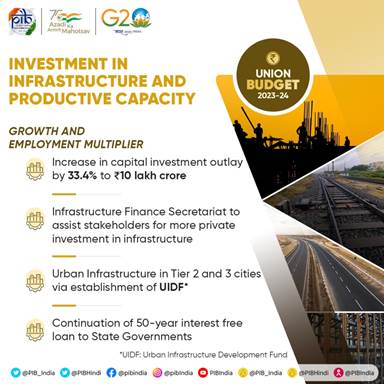
Support to State Governments for Capital Investment
The Finance Minister informed that the Government has decided to continue the 50-year interest free loan to state governments for one more year to spur investment in infrastructure and to incentivize them for complementary policy actions, with a significantly enhanced outlay of Rs 1.3 lakh crore.
Railways
The Finance Minister announced that a capital outlay of Rs 2.40 lakh crore has been provided for the Railways, which is the highest ever outlay and about 9 times the outlay made in 2013- 14.
She also informed that one hundred critical transport infrastructure projects, for last and first mile connectivity for ports, coal, steel, fertilizer, and food grains sectors have been identified and they will be taken up on priority with investment of Rs 75,000 crore, including Rs 15,000 crore from private sources.
Smt. Sitharaman said that fifty additional airports, heliports, water aerodromes and advance landing grounds will be revived for improving regional air connectivity.
The Finance Minister announced that an Urban Infrastructure Development Fund (UIDF) will be established through use of priority sector lending shortfall, which will be managed by the National Housing Bank, and will be used by public agencies to create urban infrastructure in Tier 2 and Tier 3 cities. She said that States will be encouraged to leverage resources from the grants of the 15th Finance Commission, as well as existing schemes, to adopt appropriate user charges while accessing the UIDF.
Smt. Sitharaman said that Government will make available Rs 10,000 crore per annum for this purpose.
Priority 4: Unleashing the Potential
The Finance Minister said that for enhancing ease of doing business, more than 39,000 compliances have been reduced and more than 3,400 legal provisions have been decriminalized. She added that for furthering the trustbased governance, Government has introduced the Jan Vishwas Bill to amend 42 Central Acts.
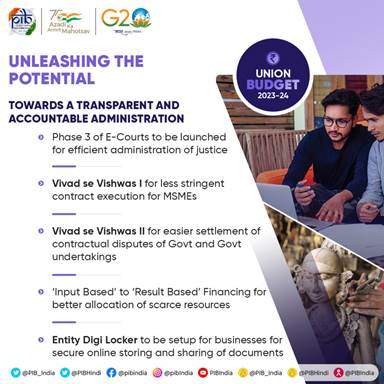
Centres of Excellence for Artificial Intelligence
The Finance Minister said that for realizing the vision of “Make A-I in India and Make A-I work for India”, three centers of excellence for Artificial Intelligence will be set-up in top educational institutions. Leading industry players will partner in conducting interdisciplinary research, develop cutting-edge applications and scalable problem solutions in the areas of agriculture, health, and sustainable cities, which will galvanize an effective A-I ecosystem and nurture quality human resources in the field.
National Data Governance Policy.
The FM said that to unleash innovation and research by start-ups and academia, a National Data Governance Policy will be brought out, which will enable access to anonymized data.
She also announced that An Entity DigiLocker will be set up for use by MSMEs, large business and charitable trusts for storing and sharing documents online securely, whenever needed, with various authorities, regulators, banks and other business entities.
On 5G Services, she announced that one hundred labs for developing applications using 5G services will be set up in engineering institutions to realize a new range of opportunities, business models, and employment potential. The labs will cover, among others, applications such as smart classrooms, precision farming, intelligent transport systems, and health care applications.
Priority 5: Green Growth
Smt. Sitharaman said that Prime Minister has given a vision for “LiFE”, or Lifestyle for Environment, to spur a movement of environmentally conscious lifestyle. India is moving forward firmly for the ‘panchamrit’ and net-zero carbon emission by 2070 to usher in green industrial and economic transition.
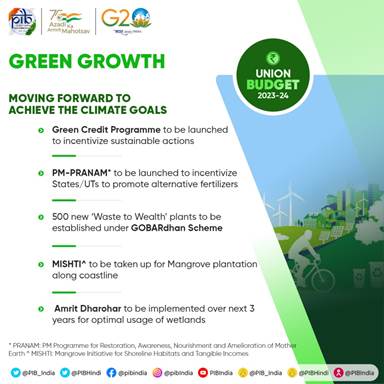
She said, this Budget builds on the focus on green growth. The recently launched National Green Hydrogen Mission, with an outlay of Rs 19,700 crores, will facilitate transition of the economy to low carbon intensity, reduce dependence on fossil fuel imports, and make the country assume technology and market leadership in this sunrise sector. The target is to reach an annual production of 5 MMT by 2030.
The Budget also provides Rs35,000 crore for priority capital investments towards energy transition and net zero objectives, and energy security by Ministry of Petroleum & Natural Gas.
The Finance Minister said that to steer the economy on the sustainable development path, Battery Energy Storage Systems with capacity of 4,000 MWH will be supported with Viability Gap Funding.
She also informed that the Inter-state transmission system for evacuation and grid integration of 13 GW renewable energy from Ladakh will be constructed with investment of Rs 20,700 crore including central support of Rs 8,300 crore.
GOBARdhan scheme
Smt. Nirmala Sitharaman announced that 500 new ‘waste to wealth’ plants under GOBARdhan (Galvanizing Organic Bio-Agro Resources Dhan) scheme will be established for promoting circular economy. These will include 200 compressed biogas (CBG) plants, including 75 plants in urban areas, and 300 community or cluster-based plants at total investment of Rs 10,000 crore.
She said, in due course, a 5 per cent CBG mandate will be introduced for all organizations marketing natural and bio gas and for collection of bio-mass and distribution of bio-manure, appropriate fiscal support will be provided.
Bhartiya Prakritik Kheti Bio-Input Resource Centres
The Finance Minister announced that over the next 3 years, the Centre will facilitate one crore farmers to adopt natural farming. For this, 10,000 Bio-Input Resource Centres will be set-up, creating a national-level distributed micro-fertilizer and pesticide manufacturing network.
The Finance Minister said that in furtherance of the vehicle scrapping policy mentioned in Budget 2021-22, she has allocated adequate funds to scrap old vehicles of the Central Government and States will also be supported in replacing old vehicles and ambulances.
Priority 6: Youth Power
The Finance Minister said that to empower the youth and help the ‘Amrit Peedhi’ realize their dreams, Government has formulated the National Education Policy, focused on skilling, adopted economic policies that facilitate job creation at scale, and have supported business opportunities.
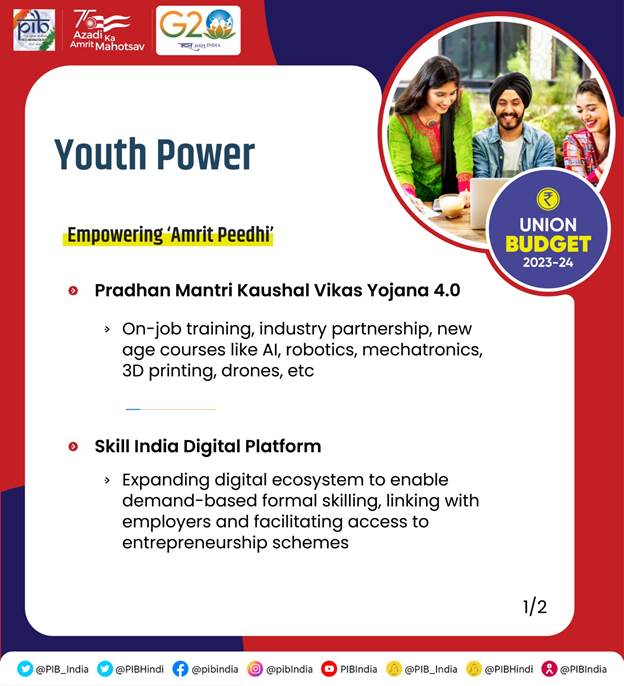
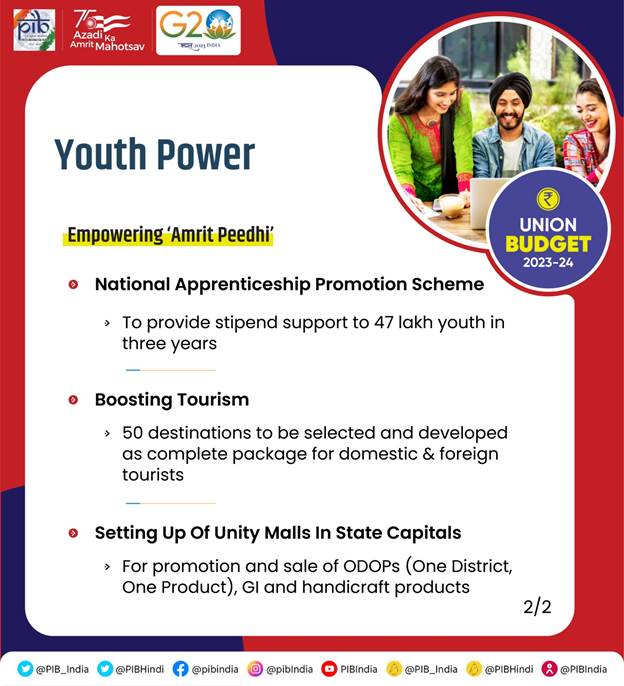
She also announced that Pradhan Mantri Kaushal Vikas Yojana 4.0 will be launched to skill lakhs of youth within the next three years. On-job training, industry partnership, and alignment of courses with needs of industry will be emphasized. The scheme will also cover new age courses for Industry 4.0 like coding, AI, robotics, mechatronics, IOT, 3D printing, drones, and soft skills.
She also announced that to skill youth for international opportunities, 30 Skill India International Centres will be set up across different States.
National Apprenticeship Promotion Scheme
Smt. Nirmala Sitharaman said that to provide stipend support to 47 lakh youth in three years, Direct Benefit Transfer under a pan-India National Apprenticeship Promotion Scheme will be rolled out.
Unity Mall
The FM said that States will be encouraged to set up a Unity Mall in their state capital or most prominent tourism centre or the financial capital for promotion and sale of their own ODOPs (one district, one product), GI products and other handicraft products, and for providing space for such products of all other States.
Priority 7: Financial Sector
Credit Guarantee for MSMEs
The Finance Minster said that last year, she proposed revamping of the credit guarantee scheme for MSMEs and announced happily that the revamped scheme will take effect from 1st April 2023 through infusion of Rs 9,000 crore in the corpus. This will enable additional collateral-free guaranteed credit of Rs 2 lakh crore. Further, the cost of the credit will be reduced by about 1 per cent.
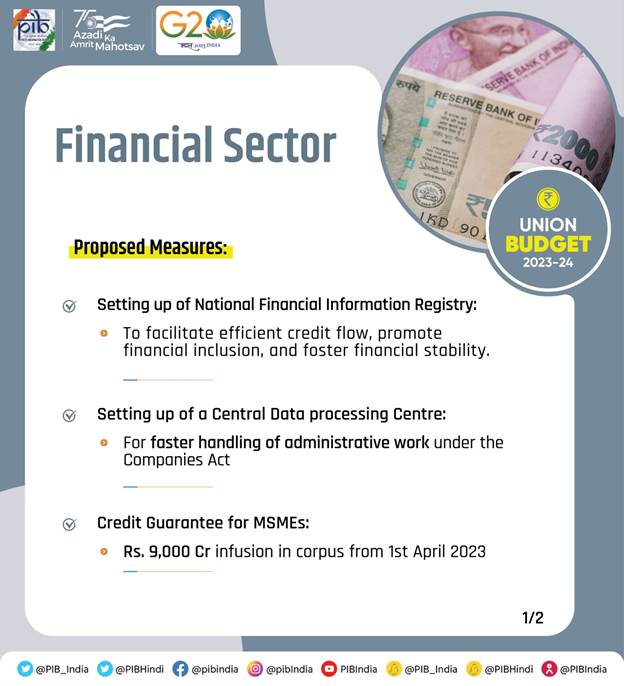
Smt. Sitharaman said that a National Financial Information Registry will be set up to serve as the central repository of financial and ancillary information. This will facilitate efficient flow of credit, promote financial inclusion, and foster financial stability. A new legislative framework will govern this credit public infrastructure, and it will be designed in consultation with the RBI.
She also announced that a Central Processing Centre will be setup for faster response to companies through centralized handling of various forms filed with field offices under the Companies Act.
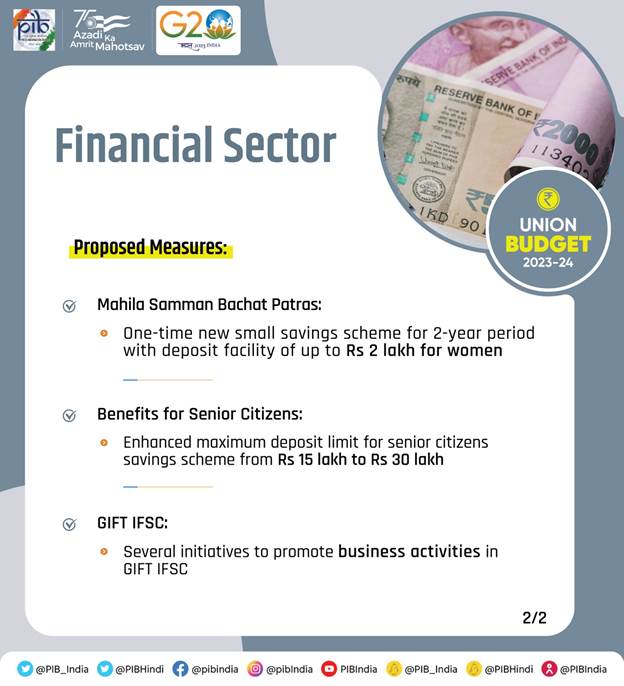
For commemorating Azadi Ka Amrit Mahotsav, a one-time new small savings scheme, Mahila Samman Savings Certificate, will be made available for a two-year period up to March 2025. This will offer deposit facility upto Rs 2 lakh in the name of women or girls for a tenor of 2 years at fixed interest rate of 7.5 per cent with partial withdrawal option.
Senior Citizens
The Finance Minister announced that the maximum deposit limit for Senior Citizen Savings Scheme will be enhanced from Rs 15 lakh to Rs 30 lakh.
Also, the maximum deposit limit for Monthly Income Account Scheme will be enhanced from Rs 4.5 lakh to Rs 9 lakh for single account and from Rs 9 lakh to Rs 15 lakh for joint account.
Fiscal Management
Fifty-year interest free loan to States
Smt. Nirmala Sitharaman said that the entire fifty-year loan to states has to be spent on capital expenditure within 2023-24. Most of this will be at the discretion of states, but a part will be conditional on states increasing their actual capital expenditure. She said, parts of the outlay will also be linked to, or allocated for, the following purposes: like Scrapping old government vehicles, Urban planning reforms and actions, Financing reforms in urban local bodies to make them, creditworthy for municipal bonds, Housing for police personnel above or as part of police stations, Constructing Unity Malls, Children and adolescents’ libraries and digital infrastructure and State share of capital expenditure of central schemes.
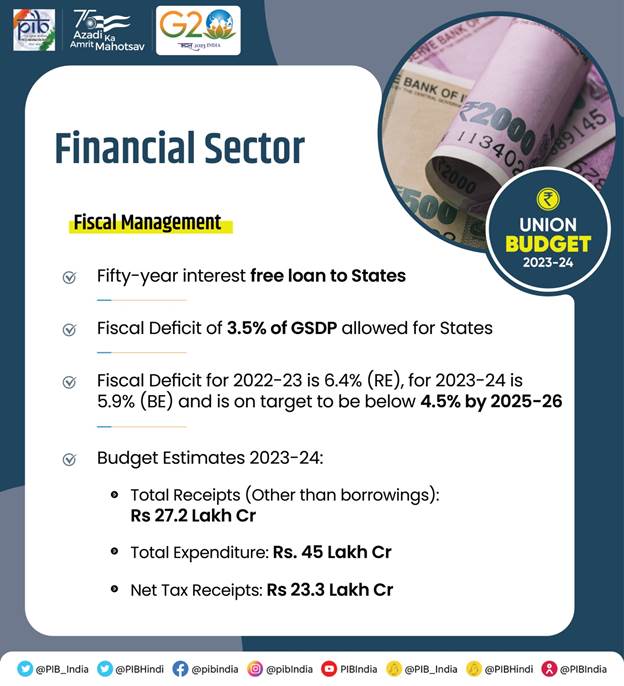
The Revised Estimate of the total receipts other than borrowings is Rs 24.3 lakh crore, of which the net tax receipts are Rs 20.9 lakh crore. The Revised Estimate of the total expenditure is Rs 41.9 lakh crore, of which the capital expenditure is about Rs 7.3 lakh crore. Similarly, the Revised Estimate of the fiscal deficit is 6.4 per cent of GDP, adhering to the Budget Estimate.
Budget Estimates 2023-24
Concluding the Part-One of the General Budget, Ms Nirmala Sitharaman said that the total receipts other than borrowings and the total expenditure are estimated at Rs 27.2 lakh crore and Rs 45 lakh crore respectively. The net tax receipts are estimated at Rs 23.3 lakh crore.
The fiscal deficit is estimated to be 5.9 per cent of GDP.
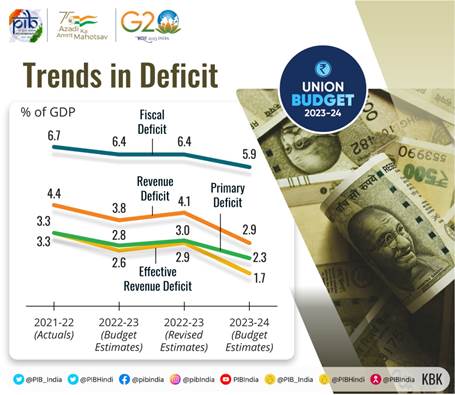
She said that in her Budget Speech for 2021-22, she had announced that Government plans to continue the path of fiscal consolidation, reaching a fiscal deficit below 4.5 per cent by 2025-26 with a fairly steady decline over the period. She said that the Government has adhered to this path, and reiterated to bring the fiscal deficit below 4.5 per cent of GDP by 2025-26.
Smt. Sitharaman said, to finance the fiscal deficit in 2023-24, the net market borrowings from dated securities are estimated at Rs11.8 lakh crore. The balance financing is expected to come from small savings and other sources. The gross market borrowings are estimated at Rs 15.4 lakh crore.
Part B
Smt Nirmala Sitharaman provides major relief in the personal income tax. The indirect tax proposals contained in the budget aim to promote exports enhance domestic value addition, encourage green energy and mobility.
Personal Income Tax
There are five major announcements relating to the personal income tax. The rebate limit in the new tax regime has been increased to ₹ 7 lakh, meaning that peons in the new tax regime with income upto ₹ 7 lakh will not have to pay any tax. The tax structure in the new personal tax regime has been changed by reducing number of slabs to five and increasing the tax exemption limit to ₹ 3 lakh. This will provide major relief to all tax payers in the new regime.
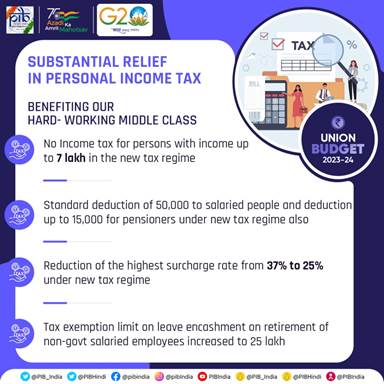
The benefit of standard deduction has been extended to the salaried class and the pensioners including family pensioner under the new tax regime. Salaried individual will get standard deduction of ₹ 50,000 and pensioner ₹ 15,000 as per the proposal. Each salaried person with an income of ₹ 15.5 lakh or more will thus gain ₹ 52,500, from the above proposals.
The highest surcharge rate in personal income tax has been reduced from 37% to 25% in the new tax regime for income above ₹2 crore. This would result in maximum tax rate of personal income tax come down to 39% which was earlier 42.74%.
The limit of tax exemption on leave encashment on retirement of non-government salaried employees has been increased from ₹3 lakh to ₹25 lakh.
The new income tax regime has been made the default tax regime. However, the citizens will continue to have the option to avail the benefit of the old tax regime.
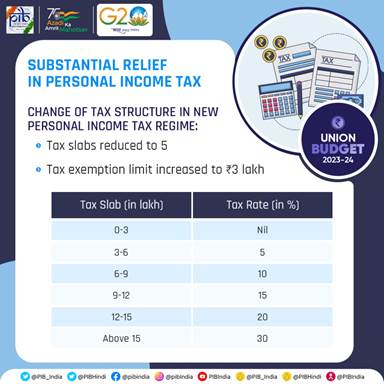
Indirect Tax Proposals
The indirect tax proposals announced in the budget by the Union Minister for Finance & Corporate Affairs, Smt Nirmala Sitharaman emphasized on simplification of tax structure with fewer tax rates so as to help in reducing compliance burden and improving tax administration. The number of basic customs duty rates on goods, other than textiles and agriculture, has been reduced from 21 to 13. There are minor changes in the basic customs duties, cesses and surcharges on items including toys, bicycles, automobiles and naphtha.
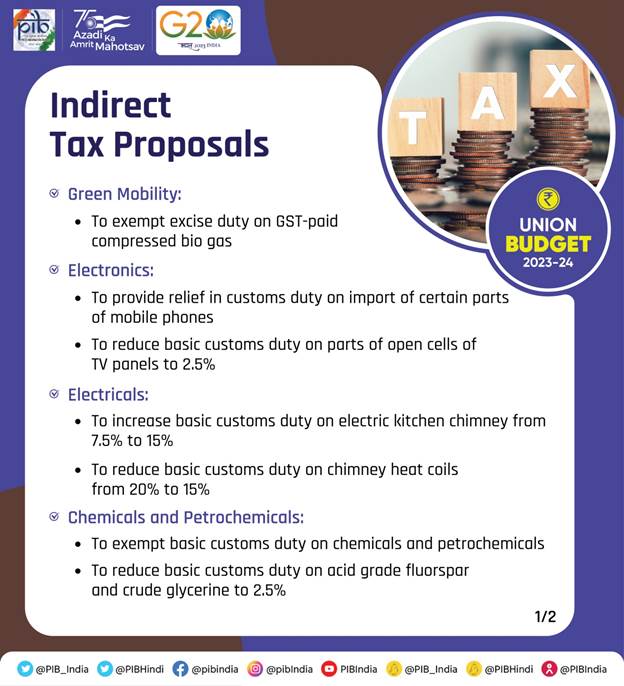
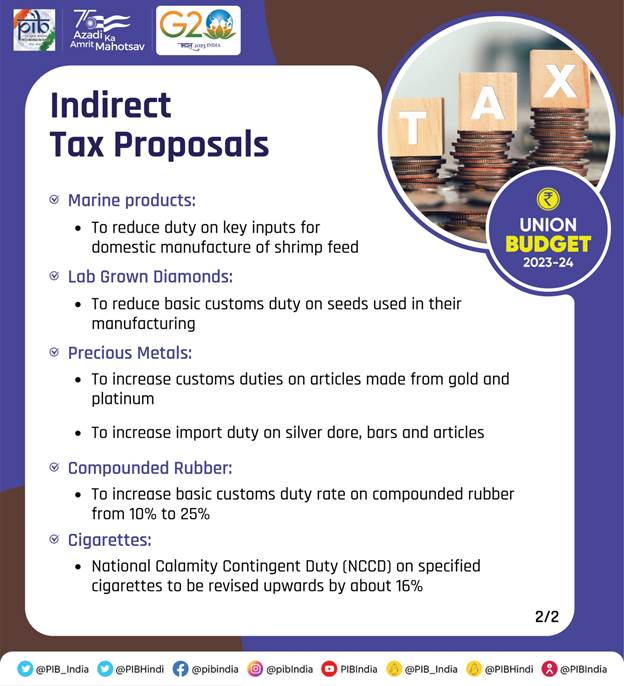
To avoid cascading of taxes on blended compressed natural gas, excise duty on GST-paid compressed bio-gas contained in it has been exempted from excise duty. Customs duty exemption has been extended to import of capital goods and machinery required for manufacture of lithium-ion cells for batteries used in electric vehicles.
To further deepen domestic value addition in manufacture of mobile phones, the Finance Minister announced relief in customs duty on import of certain parts and inputs like camera lens. The concessional duty on lithium-ion cells for batteries will continue for another year. Basic customs duty on parts of open cells of TV panels has been reduced to 2.5%. The Budget also proposes changes in the basic customs duty to rectify inversion of duty structure and encourage manufacturing of electrical kitchen chimneys.
Denatured ethyl alcohol has been exempted from basic customs duty. Basic customs duty has also been reduced on acid grade fluorspar and crude glycerin. Duty is being reduced on key inputs for domestic manufacture of shrimp feed. Basic customs duty on seeds used in the manufacture of Lab Grown Diamonds has also been reduced. The import duty on silver dore, bars and articles has been increased to align them with that on gold and platinum. The basic customs duty rate on compounded rubber has been increased. National Calamity Contingent Duty on specified cigarettes has been revised upwards by about 16%. The basic customs duty on crude glycerin for use in manufacture of epicholorhydrin is proposed to be reduced from 7.5% to 2.5%.
Common IT Return Form
The Union Budget also proposes to roll out a next-generation common IT return form for tax payer convenience. It also stipulates a plan to strengthen the grievance redressal mechanism for direct taxes. The Finance Minister also announced deployment of about 100 Joint Commissioners for disposals of small appeals in direct tax matters. She also said that the department will be more selective in taking up cases for scrutiny of returns already received this year.
Better targeting of tax concessions
For better targeting of tax concessions and exemptions, deduction from capital gains on investment in residential house has been capped at ₹ 10 crore. Income tax exemption from proceeds of insurance policies with very high value will also have limit. There are a number of proposals relating to rationalization and simplification of direct taxes in the Union Budget.
Other major proposals in the Budget relate to Extension of period of tax benefits to funds relocating to IFSC, GIFT City till 31.03.2025; Decriminalisation under section 276A of the Income Tax Act; Allowing carry forward of losses on strategic disinvestment including that of IDBI Bank; and Providing EEE status to Agniveer Fund.
Proposals relating to MSMEs
Describing MSMEs as growth engines of our economy, the Budget proposes enhanced limits for micro enterprises and certain professionals for availing the benefit of presumptive taxation. To support MSMEs in timely receipt of payments, the Budget allows deduction for expenditure incurred on payments made to them only when payment is actually made.
Cooperation
The Budget has a slew of proposals for the cooperative sector. New cooperatives that commence manufacturing activities till 31st March next year shall get the benefit of a lower tax rate of 15%. The Budget provides an opportunity to sugar cooperatives to claim payments made to sugarcane farmers for the period prior to assessment year 2016-17 as expenditure. A higher limit of ₹ 2 lakh per member has been provided for cash deposits to and loans in cash by Primary Agricultural Cooperative Societies and Primary Cooperative Agriculture and Rural Development Banks. The Budget proposes a higher limit of ₹ 3 crore for TDS on cash withdrawal for cooperative societies.
Start-ups
The Budget proposes to extend the date of incorporation for income tax benefits to start-ups from 31.03.2023 to 31.03.2024. It also provides the benefit of carry forward of losses on change of shareholding of start-ups from 7 years of incorporation to 10 years.
Amendments in CGST Act
The Budget provides for amending the CGST Act so as to raise the minimum threshold of tax amount for launching prosecution under GST from ₹ 1 crore to ₹ 2 crore, except for the offence of issuance of invoices without supply of goods and services or both. The compounding amount will be reduced from the present range of 50 to 150% of tax amount to the range of 25 to 100%. It will also decriminalize certain clauses of the Act like obstruction and preventing of any officer from discharge of his duties, deliberate tempering of evidence or failure to supply the information.
Implications of tax changes
Announcing the changes in the direct and indirect taxes, the Finance Minister said that revenue of about ₹ 38,000 crore will be foregone as a result of these proposals, while revenue of about ₹3,000 crore will be additionally mobilised. She said thus the total revenue foregone is about ₹35,000 crore annually on account of these proposals.


